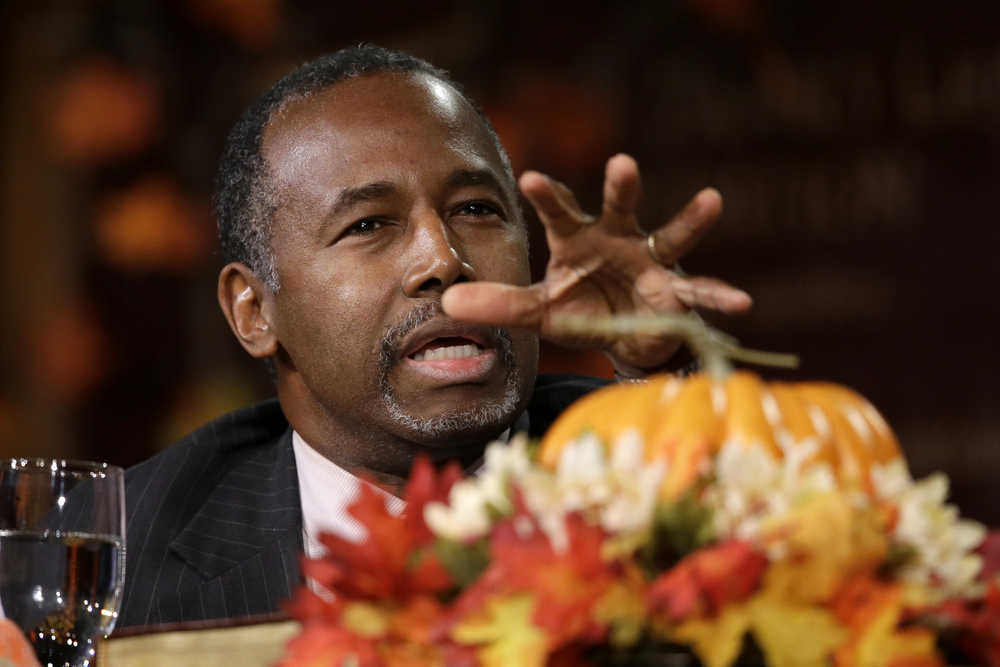COLUMBIA, S.C. — Retired neurosurgeon Ben Carson said Saturday that he wants to expand the government’s surveillance operations aimed at potential terrorist threats, even beyond tracking American Muslims as rival Donald Trump has suggested.
Trump tried Saturday to back away from his support for a government database to track Muslims in the United States, an idea that drew sharp rebukes from other Republican presidential candidates and disbelief from legal experts.
Carson, who has joined Trump atop GOP presidential preference polls, did not delve into constitutional questions about whether expanding government surveillance activities would violate First Amendment protections.
“What I have said is that I would be in favor of monitoring a mosque or any church or any organization or any school or any press corps where there was a lot of radicalization and things that were anti-American,” Carson told reporters during an appearance at a justice forum in South Carolina. He did not expound on just how an administration would determine what constitutes “radicalization” or “anti-American.”
Carson added that funding for FBI surveillance activities should be increased. He said the agency currently can only afford to monitor “30 to 60 people,” numbers he did not explain before aides steered him away from reporters.
Among those seeking the GOP nomination, former Florida Gov. Jeb Bush called the prospect of a registry “abhorrent.” Florida Sen. Marco Rubio said the idea was “unnecessary” and not something Americans would support. Texas Sen. Ted Cruz, who has largely avoided criticizing Trump throughout the 2016 campaign, said, “I’m not a fan of government registries of American citizens.”
The first reference to a database came in a Trump interview with Yahoo News published Thursday. When asked about requiring Muslims to register in a database or carry a form of special identification noting their religion, Trump said, “We’re going to have to look at a lot of things very closely.”
Asked on Thursday evening if there should be a database system for tracking Muslims in the U.S., Trump said, “There should be a lot of systems, beyond databases.” The reporter asked if that was something Trump would put in place as president. Trump replied: “I would certainly implement that. Absolutely.”
In an interview on Fox News Channel on Friday evening, Trump tried to clarify his position. “I want a watch list for the Syrian refugees that (President Barack) Obama’s going to let in if we don’t stop him as Republicans,” he said.
He addressed the issue again Saturday during a rally in Birmingham, Alabama, telling a crowd in a rambling speech that reports on his previous statements were inaccurate.
“I do want surveillance. I will absolutely take database on the people coming in from Syria if we can’t stop it, but we’re going to,” he told the crowd.
Trump also voiced support for additional surveillance, both of arriving refugees and certain mosques.
“So here’s the story just to set it clear: I want surveillance of these people. I want surveillance if we have to and I don’t care,” said Trump. “I want surveillance of certain mosques, OK. … I want surveillance. And you know what? We’ve had it before and we’ll have it again.”
Trump has also voiced support for closing certain mosques as a way to contain the terrorist threat in the U.S.
Civil liberties experts said a database for Muslims would be unconstitutional on several counts. The libertarian Cato Institute’s Ilya Shapiro said the idea violates basic privacy and liberty rights.
___
Pace reported from Washington. Associated Press writers Jill Colvin in Spartanburg, South Carolina; Steve Peoples in Sioux City, Iowa; Catherine Lucey in Des Moines, Iowa; and Julie Bykowicz and Mark Sherman in Washington contributed to this report.

